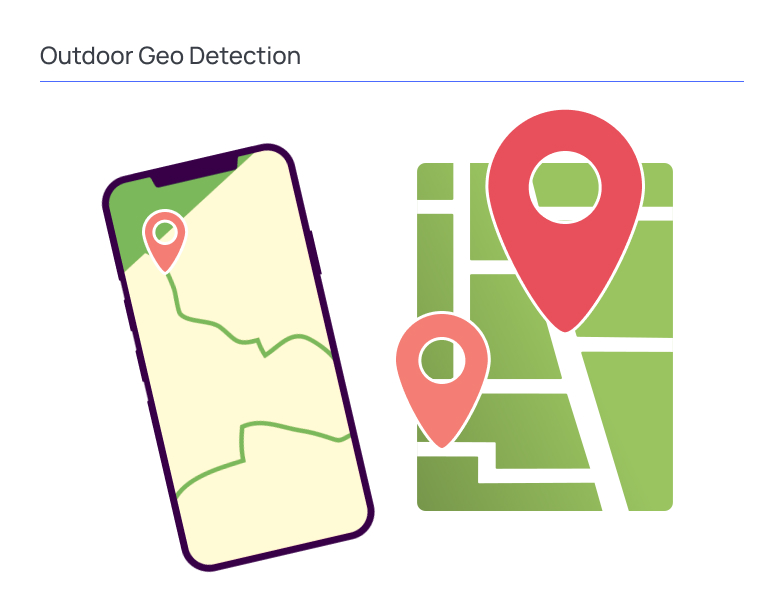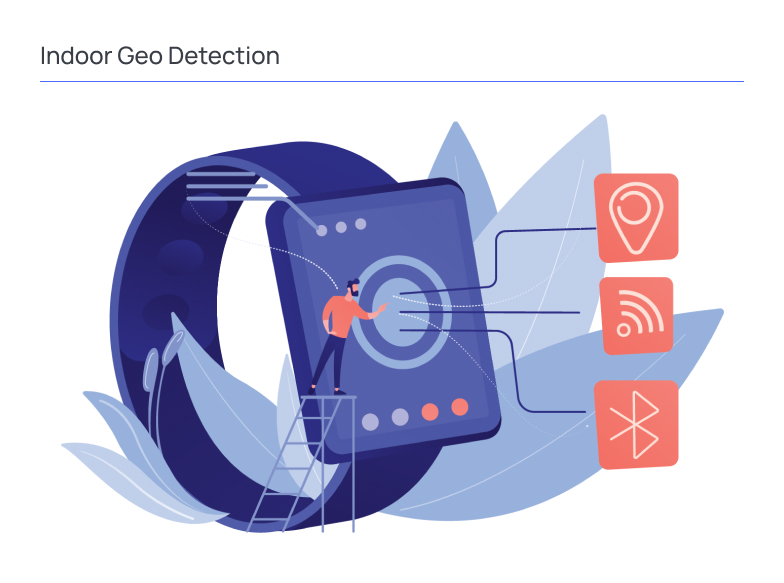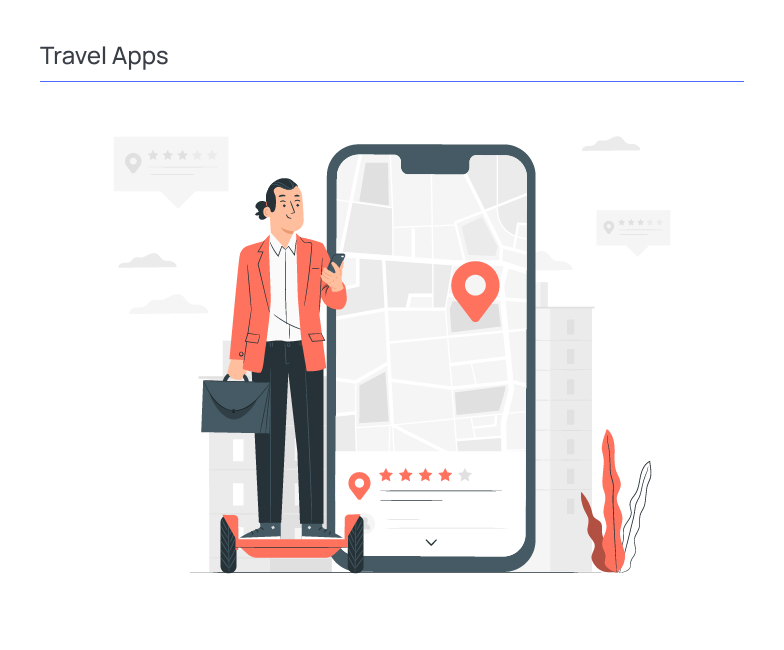Do you know that almost all apps on your phone (and it doesn’t matter how many you have) use geolocation? Geolocation is a necessary technology if your app should use location details to give additional advantages to users.
This article is a detailed guide that explains how to make a location-based service app. You will learn about the role of geolocation in apps, its benefits, types, and steps to create a geolocation app efficiently. So we recommend you read the article carefully to avoid missing important information!
What Is The Role Of Geolocation in Apps?
Geolocation in a mobile device, be it a smartphone or a tablet, ensures a precise location of the user through this device. So why do you need geolocation at all? First, it is required for user positioning. For example, when the user opens a map on a smartphone to plan a route from point A to point B, the map needs to know your precise location.
That is why companies strive to develop a location-based app to attract more customers and increase their loyalty.
The geolocation app provides the following critical functions for businesses:
Marketing Function
Geolocation makes it possible to communicate with the target users efficiently and build trustful relations with them.
Information Function
Using geolocation, users may have real-time information about all the places or objects they need to find.
Communication Function
Besides, any business may allow users to use the map to read or leave reviews about their services, upload images, and tag geolocation. It helps companies adapt to users’ preferences and expectations.
Social Function
Finally, the precise location of your users will help you enhance your brand and provide a higher level of service.
Advantages of Location-based App Development
Apart from your geolocation app’s functions, it also has multiple benefits you need to know about.
Relevant Services
Apps that use geolocation, like Postmates or Uber, may provide appropriate and quick services by locating users. Users can make an order quickly and deliver it within the shortest possible time. As a result, customer satisfaction grows.
Accurate Recommendations
Your business can use geolocation to analyze your customers’ purchase patterns so that you can provide accurate recommendations for them. As a result, your app recommends that they buy what they need precisely now. Double profit!
VR tours
Have you ever had an experience of a virtual reality tour around an online shop or hotel room? It is a fantastic experience where geolocation plays an important role. Apart from VR, you can also use augmented reality to enhance the customer experience and provide more information in a gamified form. The Binerals company is an expert in location-based app development, so we can help you create a VR app.
Effective Mobile Ads
This benefit comes with accurate recommendations. For example, when you determine a customer’s location, you can target them with special offers and provide a nearby shop where they can purchase your products or use services.
Accessible Searching
Customers use geolocation to find what they need nearby. They can calculate the distance to the location, navigate the set of sites, find them quickly and compare different services. Location-based mobile app development is challenging yet advantageous for your business.
Personalized Experience
Each customer wants to be treated as a king by a vendor. Geolocation makes it possible. You can target customers by providing a personalized mobile ad that is captivating for them. Thus, a customer has a customized experience, and they turn into your loyal customer.
The Binerals company is an expert in location-based app development, so
Contact us !How Location-based App Works
It doesn’t matter whether you need to figure out the nuances of location-based web app development or mobile app development; you should understand how location-based app works and what technologies it uses.
The location-based app uses two main ways of tracking:
- outdoor tracking;
- tracking inside a specific building.
Let’s check out more about geo-detection methods.
Outdoor Geo Detection
There are three technologies for outdoor geo detection – GPS, A-GPS, and Cell ID.
GPS. Global Positioning System, or GPS abbreviated, is a satellite navigation system used by almost all modern mobile devices. GPS allows for measuring any object’s time, distance, and location in any weather. Drivers use GPS to make routes. Travelers use it to get from one destination to another, and athletes use it to calculate the precise distance. GPS technology covers the whole globe.

- A-GPS. A-GPS means Assisted GPS, the function that helps a GPS module to receive the signal from the satellite. A-GPS combines signals received from satellites and cell towers. A-GPS accelerates the cold start of the GPS receiver.
- Cell ID Cell ID technology works when GPS is disabled. If GPS doesn’t function for any reason, a mobile phone receives the signal data from nearby cell towers. The nearest cell tower receives the coordinates of the user’s smartphone, making it possible to detect the object’s precise location. However, the accuracy of Cell ID is lower than that of GPS. It is necessary to consider this when you plan to build a location-based app.
Indoor Geo Detection
- BLE. Bluetooth Low Energy is the wireless technology that transmits data consuming low energy. It is a perfect technology to detect the object’s location within a small radius of up to 30 meters. Some shops install beacons that receive signals from potential customers’ smartphones and may provide special offers on time.

Outdoor and Indoor Geo Detection
Wi-Fi and geofencing are technologies applied in outdoor and indoor geo detection.
- Wi-Fi. Wi-Fi is the standard of wireless communication, and it uses radiowaves (the same as BLE and Cell ID) to connect devices within a small-scale radius. The most widespread example is the connection of your laptop or smartphone to the Internet network via wireless communication. Wi-Fi is also used to detect the user’s location, but it is not as accurate as GPS.
- Geofencing. Geofencing technology makes it possible to create virtual fences on a specific territory, turning this territory into a few geo zones. The user’s smartphone responds to the movement from one zone to another depending on set virtual fences. The signal about crossing the “zone border” is transmitted via GPS, Wi-Fi, or Cell ID. It is used for mobile ads, customer behavior monitoring, logistics (in taxi apps), and employee tracking.
Types of Geolocation Apps
The geolocation tracking app development doesn’t imply that your app will only track the user’s location. On the contrary, location-based apps open enormous opportunities for your business. Therefore, you only need to determine what location-aware app is advantageous for your business. This section will help you with it.
Travel apps
A travel app allows users to find the place to visit and look through the images and details of a particular area. Travel apps help users create a route, reserve a hotel room or book an airline ticket, and read and leave reviews about hotels or restaurants. Travel apps include many sub-types – flight booking apps, travel guide apps, hotel booking apps, etc. Booking.com, Airbnb, and Skyscanner are examples of travel apps.

eCommerce apps
eCommerce apps always need geolocation since these online shops provide their services to customers from different regions of the world. Building a geolocation app for the eCommerce industry means you always need to know the customers’ location to ensure a high level of service. Squarespace, Amazon, and Groupon are good examples.
Dating apps
Dating apps use GPS to help users find a soulmate in their city or country. Also, dating apps allow people to find friends with similar interests. Tinder, OKCupid, Match are one of the most popular dating apps. By the way, If you want to know how to create a dating app, you need to read our article by clicking on the link.

Navigation apps
Today, we bet that when you think of navigation apps, Google Maps is the first app that comes to your mind. This is because the map-based and navigation app provides a wide range of features for users who travel a lot. As a rule, travel apps use the API of Google Maps or other map-based apps to build accurate routes for drivers and travelers.
Social media apps
If you intend to create a chat app based on location, then you need to analyze the existing competitors among social media apps. This app allows users to interact with other users, upload images, and tag their location. You can create a social media app like Facebook or Twitter if you plan to release an app where people will share their thoughts. Or, if you want to let people entertain and share their images, you can create an app like Instagram or create an app like Snapchat.

On-demand apps
On-demand apps are all apps where services are provided on demand. So whether you order food in the DoorDash app or a taxi ride in Lyft – these are all on-demand apps. So you can apply your business strategy for on-demand app development and get a new way for customer engagement and profit increase!
Health and fitness apps
We mentioned above that athletes use wearables that track their distance traveled with GPS. Still, they need a relevant fitness app that will provide the information in a readable and user-friendly form. You can build an app to help people track their sporting tasks like cycling or swimming, plan daily activities, monitor their heart rate and hydration level, etc. Runkeeper and Strava are good examples.
How To Create A Location-based App: Steps To Consider
The next thing to consider when you want to learn to build a location-based app is a detailed guide to development. What stages does it include? This section will spell everything out.
Research and Market Analysis
First, you must research your idea and validate it. You must ensure that your app will bring something new to the market. There is no sense in creating a clone of an already existing app – your app should be outstanding. It is necessary to analyze the market and conduct competitor analysis, identifying the pros and cons of competitors’ products so that you can hit the market with something new.
Find A Software Development Partner
Once you come up with an app idea, before building an app with geolocation, you need to find the right software development company to help turn this idea into reality. To narrow down your search and save time, we recommend you pay attention to outsourcing development companies located abroad. It will be a cost-efficient yet right decision since such companies provide high services at affordable rates.
To avoid coming across a non-reliable and fraudulent vendor, you need to check a Clutch.co website. Binerals has a profile page there. This website contains only verified information about the company, transparent data, and authentic reviews. It will help you contact a trustworthy software development company.
Pick a Tech Stack
Our company pays careful attention to the software development process, so we build a strategy for each project. We choose technologies according to your web or mobile app requirements, so your location-based app will be created using relevant back-end and front-end tools. When the tech stack is picked, you are halfway to the start of the development process.
Build UI/UX design
The first impression means a lot, remember? If your app has a brilliant back end and excellent functionality, it won’t be a panacea if your app’s UI and UX design is awful. That is why UI/UX designers will do their best to create an eye-catching and user-friendly interface with an intuitive user experience.
Binerals provide a full-cycle development process starting with wireframing and prototyping, so don’t hesitate to
contact usCreate an MVP
The MVP development (Minimum Viable Product) is a beneficial option in many cases since this product has the minimum features required for app functioning. However, you can test the app, gather customer feedback and update it later if it has a thriving app life. At the same time, if you don’t gain users’ loyalty and they don’t like your app, you won’t lose too much money as it could occur with a full-fledged product.
Your location-based MVP app may have the following feature list:
- Map integration. All geolocation apps should have a map integrated. As we mentioned earlier, developers can integrate APIs of existing map-based apps like Google Maps. Maps allow users to plan routes, indicate locations, mark places, etc.
- Location tracking. It is essential for logistics and eCommerce apps that track users’ locations to deliver the order to the right destination. Also, this is a beneficial feature for travel apps.
- GPS tracking for well-being and health apps. GPS makes it possible to calculate the distance and monitor activities, so health and fitness apps always use it.
- Push notifications. Almost every app provides push notifications since it is the most effective way to inform users about new offers or remind them about important events.
This list is not exhaustive, but everything will depend on your app’s requirements and characteristics. So we will add the features that suit your app best.
Ensure Data Protection
Also, when building a location-aware app, don’t forget about compliance with local regulations. For example, if you create an app for EU-based citizens and it stores and processes their personal data, your app should comply with GDPR (General Data Protection Regulation). Ensure that your app is adequately protected from unauthorized access and malware attacks so your users will feel safe and trust your app.
Testing and Release
Every app must undergo a testing stage when it is developed. QA (Quality Assurance) engineers perform different types of testing to ensure it is bug-free and has stable and smooth performance. In addition, they need to guarantee that your app meets all the initial requirements. So this stage is essential.
When everything is done, the app functions correctly, it is ready for release, and you can evaluate user engagement and monitor critical metrics like churn rate, monthly active users, retention rate, etc.
Challenges Of Geolocation App Development
Finally, you will face two significant challenges when building a location-based app: security and accuracy. The first one was already described before.
Security
Your geolocation app must be secure and reliable for customers, so your task is to consider privacy concerns. To prevent data breaches and unauthorized access, you must enable multi-factor authentication and encrypted communication and use appropriate security certificates for Android and iOS apps. Also, keep in mind to encrypt sensitive data AES-256 algorithms.
Accuracy
It is necessary to ensure high accuracy for your location-aware app; otherwise, inaccurate positions will lead to delays and poor data interpretation. However, high-level accuracy is not so important for dating apps, while it is a must-have feature for on-demand or navigation apps.
Conclusion
The location-based app development process is tricky and challenging, but who owns the information owns the world! Binerals has prepared a comprehensive guide covering all app development nuances, so you won’t miss important information and will know how to create a geolocation app that excels.
Our company provides a wide range of services, and we can create a web app or iOS/Android native app per your requirements. Binerals builds software on a turnkey basis, which means we do everything from discovery to release.
So let’s do it! Let our experience enrich your software.
Contact BineralsFAQ
What is a location-based app?
A location-based software is any application that uses geographic data and information to provide specific services to users.How does location-based app work?
Location-based apps may use GPS, Cell ID, Wi-Fi, or BLE (Bluetooth Low Energy) to ensure the connection between the smartphone and the cell tower or satellite. The type of technology depends on the app type.Benefits of location-based apps
Geolocation apps provide higher accuracy, virtual tours, personalized experience, navigation, and easier searching.What types of geolocation apps exist?
Almost all apps you use daily are location-based – dating apps, eCommerce apps, travel apps, on-demand apps like Uber or Glovo, and social apps.How to build a location-based app?
First, you need to conduct a market analysis to know what your competitors have. Next, you create a project plan and look for a trustworthy development team. They make an MVP of your location-based software and UI/UX design. The software undergoes quality assurance, and then it is released to test the app and collect users’ feedback. You can create a full-fledged product after the MVP version if everything goes well.